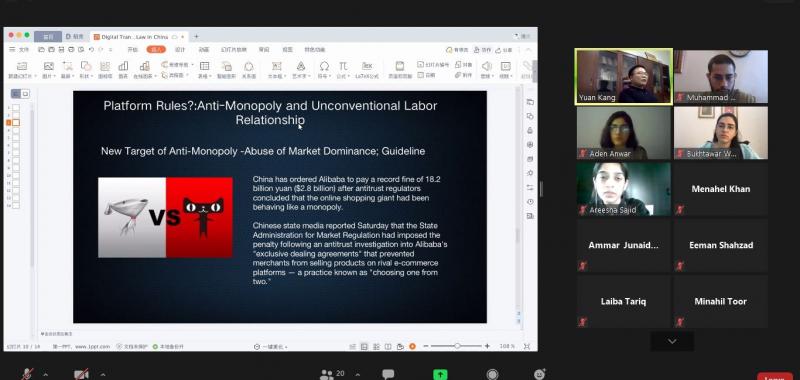
The Centre for Chinese Legal Studies (CCLS) held an online talk on the 27th of May, 2021, titled “Digital Transformation: Economic Development and Social Change”. The talk was arranged for the Centre’s interns as part of a lecture series. Professor Yuan Kang, Associate Professor at the Wuhan University, held this session on digital transformation and its challenges, along with a detailed overview of Data Security and Protection of Personal Information, Platform Rules, and Regulation of social media.
Professor Kang mentioned that apart from traditional technologies, new technologies are now driving China’s economy e.g., Artificial Intelligence, Big Data, Cloud Computing, Distributive Ledger, Internet of Things (IOT) accompanies by application scenarios such as E-commerce, E-Government, social media, Smart Home, Auto Pilot, Facial Recognition, etc. Illustrating one such technology, Professor Kang explained the use of the QR Code to fight COVID-19 in China.
The talk focused on the challenges to digital transformation starting with Tech Dominance and Loss of Human Agency as one of the major challenges preventing people from thinking and engaging intellectually. The Digital Divide is another challenge which means that the younger and literate people are at an advantage due to technological awareness as compared to the elderly and illiterate. The third challenge that Professor Kang mentioned was the Privacy Crisis which involved the discussion on sharing and recording of data. Change of Social Power Structure, according to Professor Kang, is a challenge that could potentially transfer power from the hands of the government to major social media platforms in the future.
Professor Kang further expounded upon three features of digital transformation; data security and protection of personal Information, platform rules, and regulations of social media.
1) Data Security and Protection on Personal Information: Professor Kang started off by asking the question: “Are we naked in the digital era?” He stated that most of our social interaction is now online and our data can be collected and used by various applications and companies. Professor Kang summarized Chinese cases Guo Bing vs. Hang Zhou Safari Park and Lao Dongyan vs. Beijing Metro, both related to facial recognition technologies, to show how data protection is favored in China. He compared the regulations in the EU and the US, the former said to be more stringent in data protection and the latter trying to maintain a balance between data protection and development. Professor Kang emphasized on the importance of the rules used for data protection which he said are fairly common everywhere; the principle of informed consent, the right to data portability and the right to be forgotten.
2) Platform Rules: Anti-Monopoly and Unconventional Labor Relationship. Professor Kang moved on to discuss a new force which is gaining a lot of power, the Internet Platforms. Professor Kang mentioned Didi, a Chinese platform similar to Uber, to illustrate how a monopoly is formed using price tactics. China has issued the Antimonopoly Guidelines on Platform Economy in 2021, to strengthen antitrust enforcement against such monopolistic behavior, making companies like Alibaba pay hefty fines for behaving like a monopoly. The unconventional labor relationship between such platforms and workers was also slightly touched upon. Didi’s example was again mentioned to show the informal employer-employee relationship which allows such platforms to abstain themselves from their employee’s offences.
3) Regulation of Social Media. Professor Kang highlighted the importance of regulation to keep order in cyberspace, however, Professor Kang mentioned that there are arguments on both sides to this debate. Freedom of speech is a fair right but fake news, chaos, spread of rumors and, hence, challenges to the social order can only be avoided with formal regulations. Professor Kang ended his discussion with highlighting the need for legislation that can balance development/efficiency and security and overcoming the gaps in conventional legislation by formulating new legislation that fits new social-technology relations. Professor Kang highlighted that the Chinese government has passed laws that regulate video games, e-cigarettes, applications, etc. making young people register with their real name and IDs.
Lastly, Professor Kang answered multiple questions put forward by the participants. In his answers, he acknowledged that not all laymen might understand privacy agreements and that these are usually too lengthy, hence, skipped by most people. He mentioned that China is looking to formulate summaries which highlight the terms in ordinary language so that people can be more informed of how their data can be used. With regards to questions on state surveillance of data, Professor Kang emphasized on the necessity of surveillance while also acknowledging the importance of rights such as freedom of speech, to prevent any threat to the social order. The question answer session ended touching upon the concept of inclusive development meaning development from every aspect to be shared, be it economic, technological, financial, etc.








